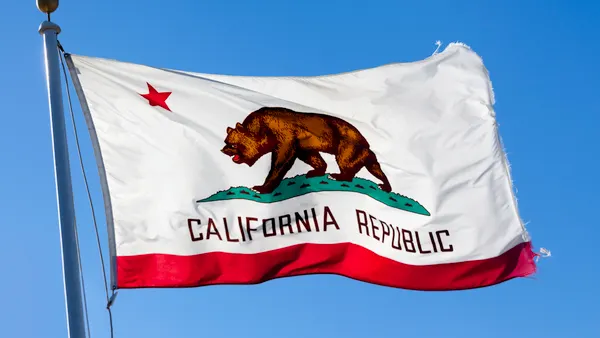Dive Brief:
- The U.S. Senate confirmed Oklahoma Attorney General Scott Pruitt to lead the Environmental Protection Agency, a controversial pick that opponents failed to block despite mounting a last-minute campaign to delay the vote.
- The new EPA administrator was approved on a vote of 52-46 after a contentious confirmation fight that focused on Pruitt's ties with the fossil fuel industry and past opposition to federal environmental regulations. Pruitt sued the agency he will now lead more than a dozen times as Oklahoma's top lawyer.
- Pruitt was confirmed the day after an Oklahoma judge ordered the release of more than 3,000 documents requested from the attorney general's office by a liberal group looking to expose ties between Pruitt and the fossil fuel industry.
Dive Insight:
Once Republican senators lined up behind him, Pruitt's nomination was never truly in jeopardy.
The Senate voted 52-46 on Thursday to end debate on the EPA nomination, lining up a Friday afternoon vote for the nation's top environmental regulator.
The vote tracked partisan affiliations with only a few exceptions. Democratic Sens. Heidi Heitkamp (ND) and Joe Manchin (WV), both from coal-heavy states, voted in favor of the nomination, while Republican Sen. Susan Collins (ME) voted against.
Throughout the confirmation process, Democrats expressed concern with Pruitt's track record as Oklahoma Attorney General, where he consistently joined oil and gas companies in challenging federal environmental regulations.
In his confirmation hearing, Pruitt said those lawsuits were aimed at stemming federal overreach, not questioning the importance of air and water regulations. The EPA has a legal obligation to regulate pollutants like carbon and mercury under the Clean Air Act, he said, but the Obama administration's programs had reached too far into state jurisdiction.
Those comments did not convince Democrats, who pointed out Pruitt's past cooperation with the fossil fuel industry on legal challenges and questioned his skepticism of mainstream climate science.
On Thursday, party leaders and environmental groups mounted a last-minute push to delay his confirmation, saying the pending the release of emails from Pruitt's Oklahoma office could uncover more details about his relationships with oil and gas companies in the state.
Republican leaders dismissed the calls, saying Pruitt had been vetted more than any other EPA nominee, and pushed on to confirm Pruitt shortly after 1 p.m.
With Pruitt installed, it likely means the White House will begin enacting more policy changes aimed at the energy sector. President Trump campaigned on promises to loosen regulations on energy production and vowed to roll back the Clean Power Plan.
EPA staff are expecting a slate of executive orders that Trump is planning to sign shortly after Pruitt is sworn in, and according to Bloomberg his first acts are likely to be aimed at rolling back greenhouse gas rules for the power sector.
Pruitt gave few details as to how his EPA would approach power sector regulation in testimony to lawmakers, but the New York Times reports that Pruitt wrote a draft of an alternative to the Clean Power Plan in 2014 as he prepared to sue the federal government over the rule.
The draft plan would reportedly allow most of the nation's coal plants to stay open while installing efficiency technologies to modestly lower emissions. If it were upheld by the courts, the Times notes that it could allow much of the coal fleet to stay online for decades longer, jeopardizing climate commitments made during the Obama administration.
But despite that earlier draft, whether Pruitt's EPA will even attempt to write another carbon regulatory package appears more uncertain after his confirmation. In his first interview since the vote, Pruitt told the Wall Street Journal he was unsure whether the federal EPA has the "tools" to regulate carbon.
"It's a fair question to ask if we do, or whether there in fact needs to be a congressional response to the climate issue," Pruitt said.
This post has been updated.













